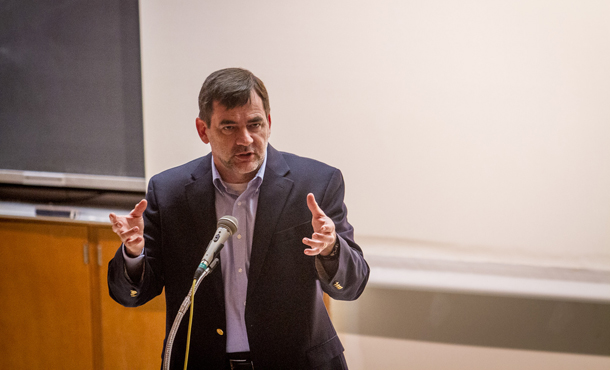As knowledge in the field of neurobiology advances, the human mind can be increasingly described by science and decreasingly explained by faith.
Psychiatrist Curt Thompson shattered this notion during a recent Suter Science Seminar at Eastern Mennonite University. “New, emerging data that we see in this world of interpersonal neurobiology… points us to this world of goodness and beauty,” said Thompson, the founder of Being Known, an LLC that produces educational materials that relate interpersonal neurobiology with Christian faith.
Rather than encroach upon religion, science embellishes it, said Thompson, citing Romans 1:20, a verse that claims God can be understood through creation. Still, one must start with a Biblical narrative, not a scientific one, he added.
The scientific field of interpersonal neurobiology studies how the human nervous system responds physically and chemically to human relationship. Thompson uses the findings from research in this area to reinforce his understanding of the Biblical narrative. He pointed out, for example, that “the brain does something very different when it seeks to know something than when it has the experience of being known.” In the same way, knowledge of God is entirely distinct from being known by God. He cited 1 Corinthians 8:3: “He who loves God is known by God.”
Thompson, who practices in Falls Church, Virginia, referenced his 2010 book Anatomy of the Soul (Tyndale) frequently during his Feb. 13 lecture.
When the human mind does not experience being known, it becomes isolated and ashamed, he said. In response, these factors contribute to a disintegration of the mind that reduces creativity and hinders growth. Thompson said that connection to a community is vital to fighting the hindrance from shame.
Thompson offered challenging questions during his lecture: What am I called to do?; If we’re going to work with the mind, what is it that we’re working with?; How well are you paying attention to what you’re paying attention to?; and Could you give me the names of three people who… could tell me everything there is to know about you?
Panelists Christian Early, a professor in EMU’s Bible and religion department, and Daryl Byler, director of EMU’s Center for Justice and Peacebuilding, offered formal responses. Early emphasized the mind-body connection Thompson hinted at. Science increasingly informs the field of philosophy that the mind and body are not as distinct as they seem, he said. Byler asked how reintegration can proceed if injury happens to an entire community rather than to an individual, to which Thompson responded that community members can be reintegrated by sharing stories.
Five lectures remain in the Suter Science Seminar Series. The next lecture, which is free and open to the public, features Gregory Koop, professor of psychology. He will speak about memory research Feb. 23 at 4 p.m. in SSC room 104.
